人教版高中英语必修二第五单元 Book 2 Unit 5 Music readingPPT教学课件
人教版高中英语必修二unit5 musicwarming up and reading教案
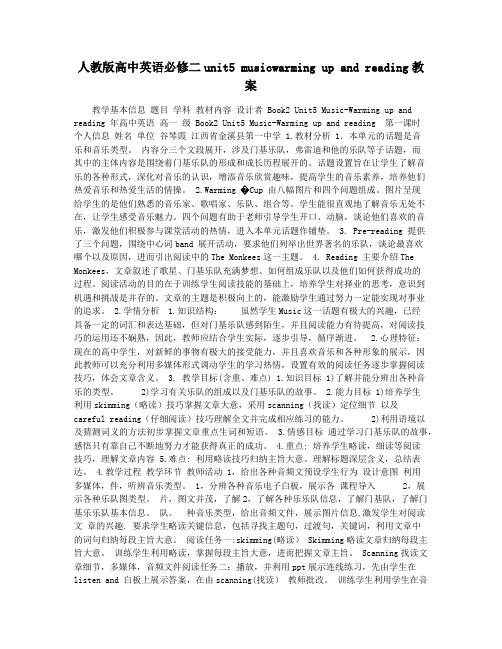
人教版高中英语必修二unit5 musicwarming up and reading教案教学基本信息题目学科教材内容设计者 Book2 Unit5 Music-Warming up and reading 年高中英语高一级 Book2 Unit5 Music-Warming up and reading 第一课时个人信息姓名单位谷琴霞江西省金溪县第一中学 1.教材分析 1.本单元的话题是音乐和音乐类型。
内容分三个文段展开,涉及门基乐队,弗雷迪和他的乐队等子话题,而其中的主体内容是围绕着门基乐队的形成和成长历程展开的。
话题设置旨在让学生了解音乐的各种形式,深化对音乐的认识,增添音乐欣赏趣味,提高学生的音乐素养,培养他们热爱音乐和热爱生活的情操。
2.Warming �Cup 由八幅图片和四个问题组成。
图片呈现给学生的是他们熟悉的音乐家、歌唱家、乐队、组合等。
学生能很直观地了解音乐无处不在,让学生感受音乐魅力。
四个问题有助于老师引导学生开口、动脑,谈论他们喜欢的音乐,激发他们积极参与课堂活动的热情,进入本单元话题作铺垫。
3. Pre-reading 提供了三个问题,围绕中心词band 展开活动,要求他们列举出世界著名的乐队,谈论最喜欢哪个以及原因,进而引出阅读中的The Monkees这一主题。
4. Reading 主要介绍The Monkees,文章叙述了歌星、门基乐队充满梦想、如何组成乐队以及他们如何获得成功的过程。
阅读活动的目的在于训练学生阅读技能的基础上,培养学生对择业的思考,意识到机遇和挑战是并存的。
文章的主题是积极向上的,能激励学生通过努力一定能实现对事业的追求。
2.学情分析 1.知识结构:虽然学生Music这一话题有极大的兴趣,已经具备一定的词汇和表达基础,但对门基乐队感到陌生,并且阅读能力有待提高,对阅读技巧的运用还不娴熟,因此,教师应结合学生实际,逐步引导,循序渐进。
2.心理特征:现在的高中学生,对新鲜的事物有极大的接受能力,并且喜欢音乐和各种形象的展示,因此教师可以充分利用多媒体形式调动学生的学习热情,设置有效的阅读任务逐步掌握阅读技巧,体会文章含义。
(最新)高中人教版英语必修2《Unit 5 Music》精品单元教案
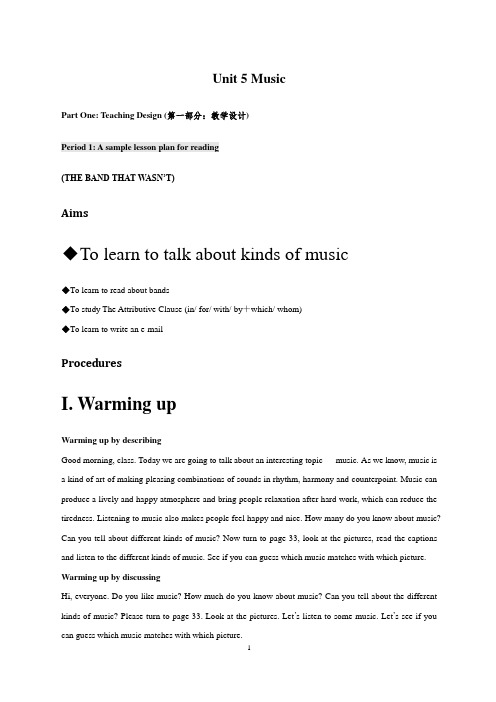
Unit 5 MusicPart One: Teaching Design (第一部分:教学设计)Period 1: A sample lesson plan for reading(THE BAND THAT W ASN’T)Aims◆To learn to talk about kinds of music◆To learn to read about bands◆To study The Attributive Clause (in/ for/ with/ by+which/ whom)◆To learn to write an e-mailProceduresI. Warming upWarming up by describingGood morning, class. Today we are going to talk about an interesting topic --- music. As we know, music is a kind of art of making pleasing combinations of sounds in rhythm, harmony and counterpoint. Music can produce a lively and happy atmosphere and bring people relaxation after hard work, which can reduce the tiredness. Listening to music also makes people feel happy and nice. How many do you know about music? Can you tell about different kinds of music? Now turn to page 33, look at the pictures, read the captions and listen to the different kinds of music. See if you can guess which music matches with which picture. Warming up by discussingHi, everyone. Do you like music? How much do you know about music? Can you tell about the different kinds of music? Please turn to page 33. Look at the pictures. Let’s listen to some music. Let’s see if you can guess which music matches with which picture.Classical music Country music Rock ‘n’ RollRap Orchestra Folk musicYes, you are right. I’m sure you will really enjoy yourselves after listening to all these beautiful music. What kind of music do you like better, Chinese or Western, classical or modern? Why? How does music make you feel? Why do you like to listen to music? Let’s discuss these questions in small groups. Try to share your opinions with one another.II. Pre-reading1.Thinking and sayingHave you heard about any of the famous bands in the world? List some if you can.2.Listening, talking and sharingLet’s listen to some pieces of music from different bands. Work in groups of four. Tell your group mates which band you like best. Why? Then the group leader is to stand up and share the group idea with the class.Do you know anything about “The Monkees”?III. Reading1.Reading aloud to the recordingNow please listen and read aloud to the recording of the text T HE BAND THAT WASN’T. Pay attention to the pronunciation of each word and the pauses within each sentence. I will play the tape twice and you shall read aloud twice, too.2.Reading and underliningNext you are to read and underline all the useful expressions or collocations in the passage. Copy them to your notebook after class as homework.3.Reading to identify the topic sentence of each paragraphSkim the text and identify the topic sentence of each paragraph. You may find it either at the beginning, the middle or the end of the paragraph.3.Reading and transferring informationRead the text again to complete the tables, which list how people formed a band and how The Monkees was formed by the TV organizers and became a real band.How do people get to form a band?How was The Monkees formed and became a real band?The Monkees in 1968 (left to right): Micky Dolenz, Peter Tork, MikeNesmith & Davy Jones4. Reading and understanding difficult sentencesAs you have read the text times, you can surely tell which sentences are difficult to understand. Now put your questions concerning the difficult points to me.IV. Closing downClosing down by doing exercisesTo end the lesson you are to do the comprehending exercises No. 1, 2, 3 and 4.Closing down by having a discussionDo you think the TV organizers were right to call “The Monkees” a band when they did not sing or write their own songs? Why?Do you agree that the jokes were more important than the music for this band? Give a reason.Closing d own by retelling the form of the band The Monkees.I shall write some key words and expressions on the board. You are to retell the form of the band according to these words.Period 2: A sample lesson plan for Learning about Language(The Attributive Clause (in/ for/ with/ by+which/ whom).AimsTo help students learn about the Attributive Clause with a preposition in front.To help students discover and learn to use some useful words and expressions.To help students discover and learn to use some useful structures.ProceduresI. Warming upWarming up by discovering useful words and expressionsTurn to page 35 and do exercises No. 1, 2 and 3 first. Check your answers against your classmates’. II. Learning about grammar1.Reading and thinkingTurn to page 34 and read with me the text of THE BAND THAT WASN’t. As you read on, pay attention to The Attributive Clause (in/ for/ with/ by+which/ whom), that is, the attributive clauses with a preposition ahead of the relative pronoun shown in the sentences.2.Doing exercises No. 1 and 2 on page 35Turn to page 34. Look at the two sentences:The musicians of whom the band was formed played jokes on each other as well as played music. However, after a year or so in which they became more serious about their work, “The Monkees” started to play their own instruments and write their own songs like a real band.Pay attention to the structure: preposition + relative pronoun. Usually only two relative pronouns --- which and whom--- can be used in the Attributive Clause, with a preposition put before the clause. That can’t be used. Look at the screen. Here are more examples on this kind of structure.Now go on to do Exercise No. 2 on page 36, that is, to sort out the sentences.III. Ready used materials for The Attributive Clause (in/ for/ with/ by+which/ whom)In formal styles we often put a preposition before the relative pronouns which and whom:∙The rate at which a material heats up depends on its chemical composition.∙In the novel by Peters, on which the film is based, the main character is a teenager.∙An actor with whom Gelson had previously worked contacted him about the role.∙Her many friends, among whom I like to be considered, gave her encouragement.Notice that after a preposition you can’t use who in place of whom, and you can’t use that or zero relative pronoun either:∙Is it right that politicians should make important decisions without consulting the public to whom they are accountable? (not --- the public to who they are accountable.)∙The valley in which the town lies is heavily polluted. (not --- The valley in that the town...)∙Arnold tried to gauge the speed at which they were traveling. (not --- the speed at they were traveling.)In informal English we usually put the preposition at the end in attributive clauses rather than at the beginning:∙The office which Graham led the way to was filled with books.∙Jim’s footballing ability, which he was noted for, had been encouraged by his parents.∙The playground wasn’t used by those children who it was built for.In this case we prefer who rather than whom (although whom is used in formal contexts). In restrictive attributive clauses we can also use that or zero relative pronoun instead of who or which (e.g. ...the children (that) it was built for).If the verb in attributive clauses is a two-or-three-word verb (e.g. come across, fill in, go through, look after, look up to, put up with, take on) we don’t usually put the preposition at the beginning:∙Your essay is one of those (which/that) I’ll go through tomorrow. (rather than...throu gh which I’ll go tomorrow.)∙She is one of the few people (who/that) I look up to. (not ... to whom I look up.)In formal written English, we often prefer to use of which rather than whose to talk about things:∙A huge amount of oil was spilled, the effects of which are still being felt. (or...whose effects are still being felt.)∙The end of the war, the anniversary of which is on the 16th of November, will be commemorated in cities throughout the country. (or...whose anniversary is on...)Note that we can’t use of which in place of whose in the patterns described in Unit 71B:∙Dorothy was able to switch between German, Polish and Russian, all of which she spoke fluently. (not..,all whose she spoke...)We can sometimes use that...of in place of of which. This is less formal than of which and whose, and is mainly used in spoken English:∙The school that she is head of is closing down. (or The school of which she is head...)Whose can come after a preposition in attributive clauses. However, it is more natural to put the preposition at the end in less formal contexts and in spoken English:∙We were grateful to Mr. Marks, in whose car we had traveled home. (or...whose car we had traveled home in.)∙I now turn to Freud, from whose work the following quotation is taken. (or...whose work the following quotation is taken from.)IV. Closing down by doing exercises:Join the sentence halves using which or whom after an appropriate preposition. (A)a.I would never have finished the work.b.It was primarily written.c.We know nothing.d.They got a good view.e.He learned how to play chess.f.Dennis scored three goals in the final.g.She was born.h.It was discovered.1.They climbed up to the top of a large rock.2. I would like to thank my tutor.3. She has now moved back to the house on Long Island.4. The star is to be named after Patrick Jenks.S. This is the ball.6. He is now able to beat his father.7. The book is enjoyed by adults as well as children.8. There are still many things in our solar system.Are these correct or appropriate? If they are, put a√. If they are not, give a reason, correct them and give alternatives if you can. (A)I. It's a piece of jewelry across which I came in an antique shop. --- which I came across in an antique shop. (‘came across’ is a two-word verb.)2. The extra work which she took on was starting to affect her health.3. My mother, after whom I looked for over 20 years, died last year.4. The people whom I work with are all very friendly.5. Some of the criticisms with which they had to put up were very unfair.6. He had many friends with whom he had a regular correspondence.7. The woman to who he is engaged comes from Poland.8. The forms which I had to fill in were very complicated.Rewrite these sentences so that they are more appropriate for formal written English. Use preposition + which or preposition + whose, as appropriate. (B)I. Tom Sims, whose car the weapons were found in, has been arrested. Torn Sims, in whose car the weapons were found, has been arrested.2. Tom Ham, whose novel the TV series is based on, will appear in the first episode.3. Dr Jackson owns the castle whose grounds the main road passes through.4. Tessa Parsons is now managing director of Simons, the company that she was once a secretary in.5. Allowing the weapons to be sold is an action that the Government should be ashamed of.6. The dragonfly is an insect that we know very little of.Period 3: A sample lesson plan for Using LanguageAimsTo read the story about Freddy and then enjoy and understand Beatles’ songs.To use the language by reading, listening, speaking and writing.ProceduresI. Warming up by listening and writingTurn to page 37 and read these sentences before listening to the tape. Then listen to the tape and decide true or false.II. Guided reading1.Reading and translatingRead more about Freddy’s life and translate it into Chinese paragraph by paragraph.2.Reading and underliningNext you are to read and underline all the useful expressions or collocations in the passage. Copy them to your notebook after class as homework.3.Doing exercisesNow you are going to do exercises No. 3, 4 and 5 on page 38 following the article.Ex3: Here are the incorrect sentences which should be crossed out.1.Freddy and his band always loved being pop stars.2.His favorite program was “Top of the Pops”.3.Things went wrong because Freddy and his band hid themselves.4.They realized they had to go because they were painful.Exercise 4 Answer these questions:1.This is an open question by which students are asked about their opinions.Answers may vary.2.Answers may vary but there is information in the reading passage that may include:--- becoming rich;--- doing a job you want to do;--- having many fans;--- people enjoying your music.3.Answers may vary but information may include:--- peaceful and quiet;--- a private life away from crowds;--- a personal life which others do not discuss.Exercise 5: The main idea is No. 3. This is a story about a band that became famous and did not like it. Only No. 3 best summarizes the main idea, while all the others reflect just part of the main idea. At first, Freddy and his band wanted to be famous, but when he became famous, they were always being followed wherever they went, which they found painful.III. Guided writing1.Writing a letter for advicePlease turn to page 38 writing. Let’s read the instructions.You’d better do some brainstorming in small groups before writing your letters. You should follow theprocedure for brainstorming and outlining introduced in Module 1 Unit 2.2.Reading Freddy’s replyLet’s read Freddy’s reply and answer the questions:--- How was Freddy’s band formed?--- What advice does Freddy give?3.Writing a note and a paragraphPlease turn to page 74. Now in pairs you are going to decide on the best way to tell a foreign friend about one kind of Chinese folk music. What do you think they need to know before they can enjoy it? Why do you like it? Who are your favorite singers? Discuss it with your partner and write notes to remind you of your most important ideas. Then write a paragraph telling your foreign friend about the type of Chinese folk music you have chosen. Use a dictionary and other reference books to help you.IV. Further applyingFinding informationGo to the library to read or get online to search in order to find more information on music and musicians. Take notes of your findings and report them to your group mates next Monday morning.V. Closing down by filling a formMake use of the text and others to fill in the form below.Closing down by describing a bandTo end this period, I am going to have two of you to describe to the class a band whom you appreciates. Who’d like to speak first?Part Two: Teaching Resources (第二部分:教学资源)Section 1: A text structure analysis of THE BAND THAT WASN’TI. Type of writing and summary of the ideaII. A tree diagramIII. A retold passage of the text 1. A possible version:Being a famous singer or musician may be the dream of many people. Becoming a member of a band may help you realize the dream. But just how can people form a band?Most musicians often meet and form a band for they are congenial with each other. High school students may also form a band to practice music together or sometimes play in the street to passers-by to earn some extra money, which is also a chance to realize their dreams of becoming famous.However, There was a band which was started in quite a different way. The musicians of whom the band was formed played jokes on each other and played music, loosely based on the Beatles. Their exciting performances were copied by other groups and were fiercely supported by their fans. That band was The Monkees.After a year or so, The Monkees became more serious of their work, playing their own instruments and writing their own music. Though it broke up in 1970, it reunited in the mid-1980s and is still popular today.Section 2: Background information on music, musicians and the band The MonkeesI. Different types of music:Folk musicIt has been passed down from one generation to another. At first it was never written down. People learned the songs from their families, relatives, neighbors and friends in the same village. These songs were about the country life, the seasons, animals and plants, and about love and sadness in people’s lives.Pop musicIt is a kind of modern music with a strong beat and not of lasting interest, especially just favored for a short time by younger people•Rock ’n’ RollIt is also called rock and roll, a kind of modern music with strong beat, played loudly on electrical instruments, in which the singer repeats the same few simple words.JazzJazz was born in the USA around 1890. It came from work songs sung by black people and had its roots in Africa. Jazz started developing in the 1920s in the southern states. Soon it was played by white musicians, too, and reached other parts of the USA.African musicIt pla ys an important part in people’s lives, especially for work, and at festivals and weddings, when people dance all night long.Indian musicIt’s not written down. There is a basic pattern of notes which the musician follows. But a lot of modern music is also written. India also produces films with music, and millions of records are sold every year. Music in the CaribbeanThe slaves who were brought from Africa developed their own kind of music. West Indians make musical instruments out of large oil cans. They hit different parts of the drum with hammers to produce different notes. This type of music has become very famous in Britain and is very good music to dance to.II. Famous musicians:Joseph Haydn(1732-1809)was an Austrian composer and is known as “the father of the symphony”. Other composers had written symphonies before Haydn, but he changed the symphony into a long piece for a large orchestra.He was born in a village in Austria, the son of a peasant. He had a beautiful singing voice. After studying music in Vienna, Haydn went to work at the court of a prince in eastern Austria, where he became director of music. Having worked there for 30 years, Haydn moved to London, where he was very successful. Wolfgang Amadeus Mozart (1756-1791)was a composer, possibly the greatest musical genius of all time. He only lived 35 years and he composed more than 600 pieces of music.Mozart was born in Salzburg, Austria. His father Leopold was a musician and orchestra conductor. Wolfgang had musical talent from a very early age. He learned to play the harpsichord in a concert for the Empress of Austria.By the time he was 14, Mozart had composed many pieces for the harpsichord, piano and violin, as well as for orchestras. While he was still a teenager, Mozart was already a big star and toured Europe giving concerts. Haydn met Mozart in 1781 and was very impressed with him. “He is the greatest composer the world has known,” he said. The two were friends until Mozart’s death in 1791.Ludwig van Beethoven (1770-1827)was born in Bonn, Germany. He showed musical talent when he was very young, and learned to play the violin and piano from his father, who was a singer. Mozart met Beethoven and was impressed by him. “He will give something wonderful to the world,” he said. Beethoven met Haydn in 1791, but was not impressed by the older man. After they had known each other for many years, Beethoven said, “He is a good composer, but he has taught me nothing.” However, it was Haydn who encouraged Beethoven to move to Vienna. Beethoven became very popular in the Austriancapital and stayed there for the rest of his life. As he grew older, he began to go deaf. He became completely deaf during the last years of his life, but he continued composing.III. Musical instrument 乐器saxophone electrical equipment pianoguitar fluteV. What are the functions of music?•Make things more lively and interesting•Make things better for people to understan d and enjoy•Express people’s feeling•Make people feel good•Help people forget their pain•Attract people’s attention•help people to remember things wellVI. The introduction of the band The MonkeesThe Monkees were a four-person band who appeared in an American television series of the same name, which ran on NBC from 1966 to 1968. The Monkees were formed in 1965 in Los Angeles, California and disbanded in 1970. At their peak they were one of the most popular musical acts of their time.Several reunions of the original lineup have taken place. The first reunion lasted from 1986 to 1989, and a second regrouping took place between 1996-1997. The Monkees last worked together for a brief period in 2001.Section 3: Words and expressions from Unit 5 THE BAND THAT W ASN’TI. Words for Readingclassicaladj. (of music)put together and arranged(composed) with serious artistic intentions; having an attraction that lasts over a long period of time(as opposed to popular or folk music)(音乐)古典的Bach and Beethoven wrote classical music. the classical music of India/ the classical symphonyrollvt.&vi.1. to (cause to) move along by turning over and over(使)滚动We rolled the barrels of oil onto the ship. Tears were rolling down her cheeks. 2. to move steadily and smoothly along(as) on wheels(车轮)滚动;转动The train rolled slowly into the station. The waves rolled over the sand. 3. (of a ship)to swing from side to side with the movement of the waves摇摆;摇晃The ship rolled so heavily that we were all sick.4. keep the ball rolling: to keep things active and moving(使事情,工作等)继续进行下去;不松懈5.set the ball rolling: to be the first to do something, hoping that others will follow带动;带头(希望他人跟随)I’ll sing a song first, just to set the ball rolling.folkadj. of, connected with, or being music or any other art that has grown up among working and/or country people as an important part of their way of living and belongs to a particular area, trade, etc., or that has been made in modern times as a copy of this(音乐;艺术)民间的;民俗的folk music/ folk songs/ Chinese folk art/ give a folk concert/a folk singerjazz n.爵士音乐traditional jazz/ modern jazz/ jazz music/ a jazz bandmusician n.音乐家a fine musiciandreamn. 1. a group of thoughts, images, or feelings experienced during sleep梦2. sth. imaged, not real, but believed in or greatly and hopefully desired理想;梦想v.梦见;梦想dream of/about (doing) sth./ dream a dreamclapvi.鼓掌Clap one’s hand in time to the music/ clap sb. on sth./ clap sb. on the back/clap eyes on sb.be honest with = be frank with/ to tell you the truthformvt.&n.(使)组成;形成form some ideas or opinion about sth./ form a nation/ form a line/ form good habits/ in the form of/ in form/ fill in the form/ take the form ofpasser-by n. 过路人;行人passers-by/ ask the passer-byearnvt. 1. to get (money) by working赚;挣(钱)He earns $10000 a year(by writing stories).2.to get(sth. that one deserves)because of one’s qualities博得;赢得He earned the title of “The Great” by his victories in the war. earn money/ earn one’s living / earn sb. successloosely adv.宽松的;松散的loosely speaking/ loosely translatedadvertisementn. also ad--a notice of sth. for sale, service offered, job position to be filled, room to let, etc., as in a newspaper, painted on a wall, or made as a film广告the advertisement page/ advertisement for sb./sth./ put an advertisementactor n. 男演员;行动者actor and actress/ an excellent actorattractiveadj. having the power to attract有吸引力的The idea is very attractive. sound attractive/ at attractive price fann. 1.扇子turn the fan on 2.a very keen follower or supporter, as of a sport, performing art, or famous person迷;狂热者fan clubinstrumentn.工具;器械;乐器play an instrument/ the instruments of the orchestra/ a ship’s instruments II. Words for Learning about Languagehitn.(演出等)成功;打击a direct hit on an enemy ship/ a final score of two hits and six misses/ a hit with everyone/ His film is quite a hit/ They sang their latest hit./ make a hitsortn.& vt.种类;类别;分类;整理the sort of person I really dislike/ What sort of paint are you using?/ sort sth. out (into) sth./ sort through sth.III. Words for Using Languageafterwardsadv. later; after that以后;后来Let’s go to the theatre first and eat afterwards.performvt.& vi. 1. to do; carry out(a piece of work)实行;做The doctor performed the operation. 2. to fulfill (a promise, order, etc.) 履行;执行(允诺,命令)3. to give, act or show(a play, a part(role)in a play, a piece of music, tricks, etc.) esp. before the public表演perform a task/ perform one’s duty/ perform an operation to save one’s life/ perform the piano/perform skillfully on the flute/ perform live on television/ perform a ceremonyperformancen.表演;履行faithful in the performance of one’s duty/ the evening performance/give a performance of “Hamlet”/ in performancestickvi 1. to (cause to) be fixed with a sticky substance粘贴;张贴Stick a piece of paper over the old address and write the new one on it.stick to one’s fingers/ stick a stamp on a letter 2. stick to: to refuse to leave or change/stick up a note on the note-board/ stick the pen behind the ear坚持;固守stick to one’s plan/to stick to one’s promiseabilityn. power and skill, esp. to do, think, act, make, etc.(尤指工作, 思考,行动,创造等)能力a machine with the ability to copy with large loads/ have the ability to do the work/ a woman of great ability/ have a great musical abilitysayingn.话;俗话‘More haste, less speed,’ as the saying goes.reputationn. (an) opinion held by others(about someone or sth.); the degree to which one is well thought of名誉;名声: a school with an excellent reputation/ a good reputation as a doctor/ have a reputation for laziness/ ruin sb.’s reputation/ make a reputation for oneself/ live up to one’s reputationunknownadj.& n. 不知道的;未知的人或物unknown forces/ an unknown actor/ unknown to sb./ a journey into the unknown21。
人教版高中英语必修二Unit5Music考点总结(带答案)

人教版高中英语必修二Unit5Music考点总结单选题1、________from the tower, the south foot of the Purple Mountain is a sea of trees.A.SeeingB.SeenC.To seeD.To be seen答案:B考查过去分词。
句意:从塔顶上看,紫金山南麓是一片树木之海。
分析句子结构可知,see在句子中不是谓语动词,the south foot of the Purple Mountain和动词see 之间是被动关系,所以see应该用过去分词的形式作状语。
故选B项。
2、Artificial intelligence has already made an impact on our lives in many ways.A.影响B.冲击C.撞击D.挤入答案:A考查名词。
句意:人工智能已经在很多方面影响了我们的生活。
make an impact on 对……产生影响,所以名词impact为“影响”之意。
故选A。
3、________ in thought, he didn’t notice his teacher coming into the classroom at all.A.LosingB.Having lostC.LostD.To lose答案:C考查非谓语动词。
句意:陷入沉思中,他完全没注意到老师走进了教室。
分析句子结构可知,已有谓语动词didn't notice,空处需填非谓语动词作状语,“陷入沉思”表达为be lost in thought,故此空用过去分词作状语。
故选C。
4、She is so __________ a woman that she is certain of her views. A.familiarB.ordinaryC.significantD.confident答案:D考查形容词。
人教版高中英语必修2 Unit 5 Music
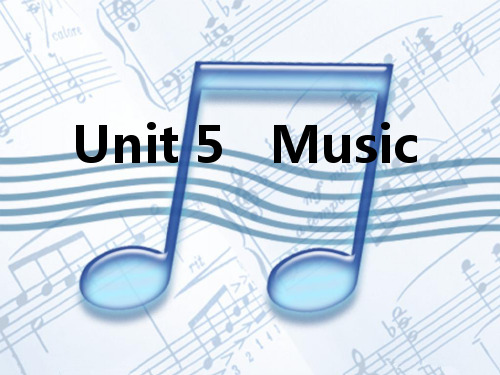
Westlife
Backstreet boys
The Beatles
披头士 (甲壳虫乐队)
The Band That Wasn't
It is praised as “ American Beatles”
The members of the band are: David Jones, Micky Dolenz, Peter Tork, Michael Nesmith
TV organizers
an advertisement
one musician three actors a TV show
play jokes on as well as play music (based loosely on the “Beatles”)
The rห้องสมุดไป่ตู้ad to success
Questions:
How was the Monkees formed?
Why did they become popular?
In what ways is the Monkees similar to or different from other bands?
How do people form a band (Para.2)
Homework: WRITE AN COMPOSITION
(1)Have you wanted to be part of a band as a famous singer or musician?
(2) Have you ever dreamed of playing in front of thousands of people at a concert, at which everyone is clapping and appreciating your music?
新教材 人教版高中英语必修第二册 unit5 Music 精品教学课件(共231页)
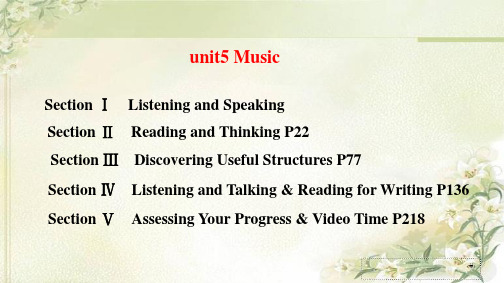
发音提示
失去爆破 当一个爆破音后面紧接着有一个爆破音或破擦音、或鼻音、 或舌侧音时,前面一个音只按其发音部位形成阻碍,但不发生 爆破,这种现象称为“失去爆破”。 以下五种情况会出现失去爆破: 1.爆破音+爆破音 两个爆破音相连时,前一个失去爆破,后者则要完全爆破。 如:She sai(d) to herself.
Section Ⅱ Reading and Thinking
词汇认知
汉译英 1. virtual adj.很接近的;事实上的;虚拟的 2. opportunity n.机会;时机 3. onto prep.(朝)向 4. studio n.演播室;(音乐的)录音棚;工作室 5. ordinary adj.普通的;平凡的 6. prove vt.证明;展现 7. award vi.授予 n.奖品
语境领悟
(1)Only with all your time and energy can you do the job well.
只有用上你全部的时间和精力你才能把这项工作做好。 (2)She’s always full of energy. 她总是充满活力。
(3)Where do those kids get their energy from? 那些孩子哪来这么多精力?
学以致用 选词填空(energy/power/strength/force) (1)Not that I don’t want to help you,but that it’s beyond my power to do so. (2)She has always been encouraged to swim to build up the strength of her muscles.
人教版高中英语必修第二册第五单元Unit 5 Music Reading
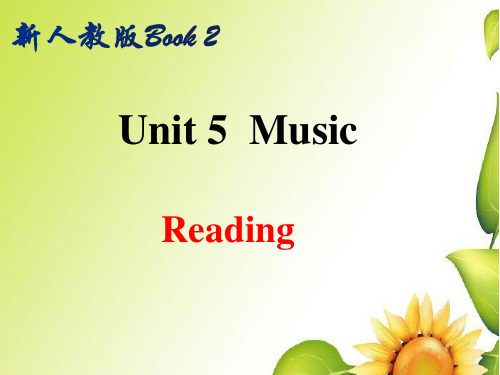
4. I _f_e_ll_in__lo_v_e_ with rap music when I was a teenager. Listening to it _e_n_a_b_le_d_ me to relax and forget about my problems.
Make difference between the virtual choir and the reality choir.
Virtual choir
Reality choir
Form
video
live
Place
Internet
stage of music hall
(home/anywhere)
haven’t
anything, come to the concert holding
held
by my favorite band in the city stadium.
I'm sure you will not regret it. The
^ concert will be on Sunday. Clearly
Identity of ordinary people
professionals
singers
musicians
Number of singers
not limited
Hale Waihona Puke limited to the required programme
高中英语必修二 课文详解Book 2-unit 5

必修二Unit 5 Music 音乐I.Vocabularyclassical adj.古典的;古典文艺的roll vt. & vi.滚动;(使)摇摆n. 摇晃;卷;卷形物;面包圈rock’n’roll (rock-and-roll)摇滚乐orchestra n. 管选乐队rap n. 说唱乐folk adj. 民间的jazz n. 爵士音乐choral adj.唱诗班的;合唱队的the Monkees n.门基乐队musician n.音乐家dream of 梦见;梦想dream about 梦想pretend vt.假装;假扮to be honest说实在地;实话说attach vt. & vi.系上;缚上;附加attach…to…认为有(重要意义);附上;连接form vt.(使)组成;形成;构成fame n.名声;名望above all 最重要;首先passer-by n.过路人;行人earn vt.赚;挣得;获得extra adj. 额外的;外面的instrument n.工具;器械;乐器perform vt. & vi.表演;履行;执行performance n.表演;演奏pub n. 酒馆;酒吧in cash 用现金;有现钱studio n.工作室;演播室millionaire n.百万富翁;富翁play jokes on 戏弄actor n. 男演员;行动者relay vi. 依赖;依靠relay on 依赖;依靠broadcast n. vi. vt. 广播;播放humorous adj.幽默的;诙谐的familiar adj.熟悉的;常见的;亲近的be/get familiar with熟悉or so 大约break up 打碎;分裂;解体reunite vt.再统一;再联合;重聚attractive adj.吸引人的;有吸引力的addition n.加;增加;加法in addition 另外;也sort out 分类excitement n. 兴奋;刺激ballad n.歌谣情歌;民谣overnight adv.在晚上;在夜里dip vt. 蘸;浸tadpole n.蝌蚪lily n.百合;百合花confident adj.自信的;确信的brief adj.简短的;简要的n. 摘要;大纲briefly adv.简要地;短暂地devotion n.投入;热爱afterwards adv.然后;后来invitation n.邀请;招待beard n.胡须sensitive adj.敏感的;易受伤害的painful adj.疼苦的;疼痛的II. Reading THE BAND THAT W ASN’T 已逝的乐队Have you ever wanted to be part of a band as a famous singer or musician?译文:你是否曾想过:作为一名著名歌手或是著名音乐家来加入一个乐队?Have you ever dreamed of playing in front of thousands of people at a concert, at which everyone is clapping and appreciating your music?译文:你是否曾想过在音乐会上站在成千上万的观众面前进行演出,人人为你鼓掌,人人欣赏你的音乐?【注释:①dream of⑴梦见eg. 1) I often dreamed of my younger brother soon after I left home.刚离开家时, 我常梦见弟弟。
人教新课标高中英语必修(二)-Unit5 Music 全单元课件 (共178张)

Task 1 Brain-storming
Can you name any music style?
classical music hip-pop and rap
light
pop
rock
musical style
and roll
folk
heavy metal
Do you know the Monkees ?
The four members of the Monkees
A big hit!
Find the topic sentence of each paragraph. • Paragraph 1: Have you ever wanted to be a
Paragraph Main idea
one
dreaming of being a famous musician or singer
two
how musicians form bands
three four
how the Monkees got their start how the Monkees became serious about the music business
Beatles & Monkees 3.How do bands that are formed by high school students earn some extra money?
They may play to passers-by in the street or subway so that they can earn some extra money.
2.Which two musical bands are mentioned in the passage?
新人教版高中英语必修二Unit5Music单元分析
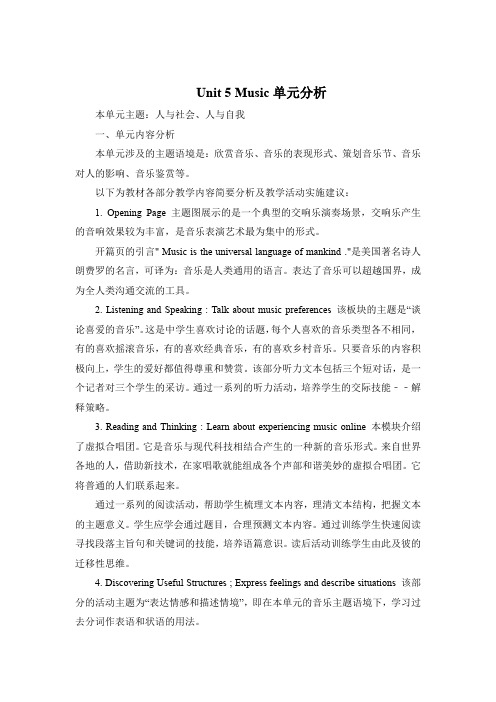
Unit 5 Music单元分析本单元主题:人与社会、人与自我一、单元内容分析本单元涉及的主题语境是:欣赏音乐、音乐的表现形式、策划音乐节、音乐对人的影响、音乐鉴赏等。
以下为教材各部分教学内容简要分析及教学活动实施建议:1. Opening Page 主题图展示的是一个典型的交响乐演奏场景,交响乐产生的音响效果较为丰富,是音乐表演艺术最为集中的形式。
开篇页的引言" Music is the universal language of mankind ."是美国著名诗人朗费罗的名言,可译为:音乐是人类通用的语言。
表达了音乐可以超越国界,成为全人类沟通交流的工具。
2. Listening and Speaking : Talk about music preferences 该板块的主题是“谈论喜爱的音乐”。
这是中学生喜欢讨论的话题,每个人喜欢的音乐类型各不相同,有的喜欢摇滚音乐,有的喜欢经典音乐,有的喜欢乡村音乐。
只要音乐的内容积极向上,学生的爱好都值得尊重和赞赏。
该部分听力文本包括三个短对话,是一个记者对三个学生的采访。
通过一系列的听力活动,培养学生的交际技能﹣﹣解释策略。
3. Reading and Thinking : Learn about experiencing music online 本模块介绍了虚拟合唱团。
它是音乐与现代科技相结合产生的一种新的音乐形式。
来自世界各地的人,借助新技术,在家唱歌就能组成各个声部和谐美妙的虚拟合唱团。
它将普通的人们联系起来。
通过一系列的阅读活动,帮助学生梳理文本内容,理清文本结构,把握文本的主题意义。
学生应学会通过题目,合理预测文本内容。
通过训练学生快速阅读寻找段落主旨句和关键词的技能,培养语篇意识。
读后活动训练学生由此及彼的迁移性思维。
4. Discovering Useful Structures ; Express feelings and describe situations 该部分的活动主题为“表达情感和描述情境”,即在本单元的音乐主题语境下,学习过去分词作表语和状语的用法。
人教高中英语必修2 Unit5 Music reading 课件
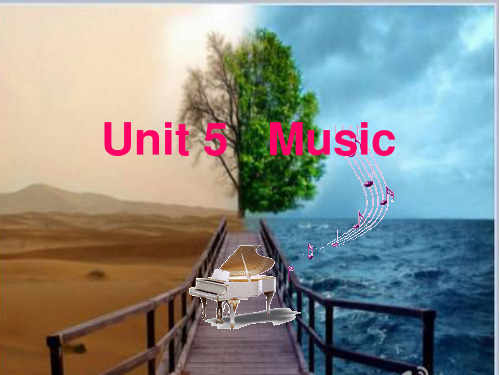
Retelling
in 1996
a
produced a new record
real
in the mid-1980s
band
in about 1970
reun?ited
However,aft?er a year or so
br?oke up
became serious
each week on TV
jokes&music
Sing songs written by o?ther musicians
began
based on ?The Beatles as ?a TV s_ia_n_
and threea_c_t_o_rs__
• The Monkees began as a__T_V__sh_o_w___ . There was only one who could _s_in_g_ well and the other three members were _a_ct_o_r_s.During the broadcasts they just _p_re_t_e_n_d_e_d_t_o sing.
e the right reading skills to finish the reading exercises.
4.Learn about the important factors to success.
Actually, I like music very much. When I was a
Unit 5 Music
The Band That Wasn’t
Learning objectives:
1.Master the words and phrases related to the formation and development of a band.
人教版高一英语必修二 Unit 5 Music (2)

Scan the text to find specific information such as dates, numbers, and names.
Scan and circle the information in the text. (P52 Ex.2)
Look at the title and predict. THE VIRTUAL CHOIR
1. What is a virtual choir? 2. What aspects of the virtual choir does the
passage mainly talk about?
Look at the title and predict.
“Music helps me to … forget my problems. With music, I become
someone else.” (Paragraph 1)
Why
Read to get the main idea.
What does the passage mainly tell us?
How
common
… A virtual choir helps connect ordinary people together. Many people
do not have close friends or
music. Many others do not have the chance to join a local choir. A virtual
choir enables them to add their voices to those of other individuals and
人教版高中英语必修第二册 《Unit 5 Music》教案
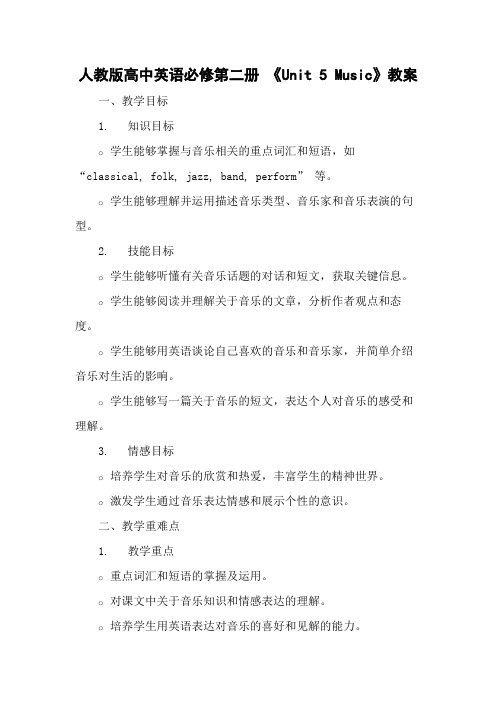
人教版高中英语必修第二册 《Unit 5 Music》教案一、教学目标1.知识目标o学生能够掌握与音乐相关的重点词汇和短语,如 “classical, folk, jazz, band, perform” 等。
o学生能够理解并运用描述音乐类型、音乐家和音乐表演的句型。
2.技能目标o学生能够听懂有关音乐话题的对话和短文,获取关键信息。
o学生能够阅读并理解关于音乐的文章,分析作者观点和态度。
o学生能够用英语谈论自己喜欢的音乐和音乐家,并简单介绍音乐对生活的影响。
o学生能够写一篇关于音乐的短文,表达个人对音乐的感受和理解。
3.情感目标o培养学生对音乐的欣赏和热爱,丰富学生的精神世界。
o激发学生通过音乐表达情感和展示个性的意识。
二、教学重难点1.教学重点o重点词汇和短语的掌握及运用。
o对课文中关于音乐知识和情感表达的理解。
o培养学生用英语表达对音乐的喜好和见解的能力。
2.教学难点o如何帮助学生准确运用丰富的词汇和句型描述音乐。
o引导学生深入理解音乐的内涵和价值。
三、教学方法1.视听教学法:通过播放音乐、视频等让学生直观感受音乐的魅力。
2.讨论交流法:组织学生讨论音乐相关话题,促进学生思维碰撞和语言表达。
3.情景创设法:创设音乐场景,让学生在情境中学习和运用语言。
四、教学过程(一)导入(5 分钟)1.播放一段不同类型的音乐片段,如古典音乐、流行音乐、摇滚音乐等。
2.提问学生:What kinds of music do you hear? How do they make you feel?(二)词汇教学(10 分钟)1.展示本单元的重点词汇和短语,结合音乐实例进行讲解。
2.开展词汇游戏,如音乐词汇猜猜猜,加强学生对词汇的记忆和理解。
(三)阅读前准备(5 分钟)1.让学生观察课文标题和图片,预测文章内容。
2.提出一些引导性问题,如:What do you think thepassage will be about music?(四)课文阅读(15 分钟)1.学生快速阅读课文,概括文章的主要内容。
高中英语 Unit 5 Music课件 新人教版必修2
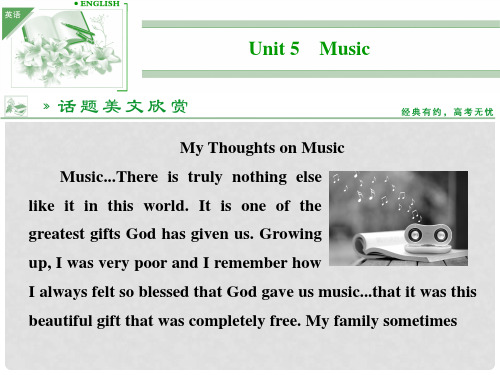
1.The writer is crazy about music.
()
2.The writer's family is not so rich. 3.People have the same feeling of music. 4.Song will bring everything to us.
went without electricity or water and I remember thinking that it was no big deal because I still had my music...and it couldn't be taken away from me. I remember climbing to the top of my treehouse as a boy and turning on my radio and just listening for hours...doing nothing but lying on my back and staring at the stars. I remember that Triumph sang the first song that really touched me. I would listen to the words over and over again. “I'm young, I'm wild and I'm free... got the magic① power of the music in me....”
This being true, one good song can make for a great day.
Notes: ①magic [mædʒIk] adj.魔术的;幻术的n.魔法
高中英语人教版必修2《Unit5 Music》课件

• 1.(2012·陕西高考)...Barking 37(loudly) into the
air,the dog 38(searched) through the woods until
he found the 39(house).But the girl was not there ,so he headed back to the woods.Much to his 40
人教版 高中英语
Unit5 Music
Ⅰ.立体式复习单词 A.基础单词
1.
vt./vi.转动,(使)摇摆 n.摇动,卷,面包圈
2.
vt.假装,假扮
3.
vt./vi.系上,缚上,附加,连接
4.
vt.(使)组成,形成,构成
5.
vt.赚,挣得,获得
6.
adj.额外的,外加的
• 7. n.广播,播放
• 8. adj.熟悉的,常见的,靠近的
• 11.
• 12. 靠的
vt./vi. n.表演者
vi.
n.表演, adj.可依靠的,可依
• 13. adj.
vt.吸引
n.吸引,吸引力,吸引人的事物
• 14. n.
adj.附加
• 15.
adj.
n.
adv.自信地,确信地
• 16. adj. 短暂地
adv.扼要地,
• 17.
n.
v.献身,为……付
49.C。根据这段语篇可以体会到 Glen Kruger 向妻子 求助没有得到回应要失望时,突然看到了 Inky 那种欢乐的心 情,因此挑选 then 表示“就在那个时候”。
【技能点拨】 考生做题时如果能充分推敲这些语篇标志语,就可以迅 速理清文章的脉络,弄清上下文之间的关系。
2019统编人教版高中英语必修第二册unit 5《Music》全单元教案教学设计
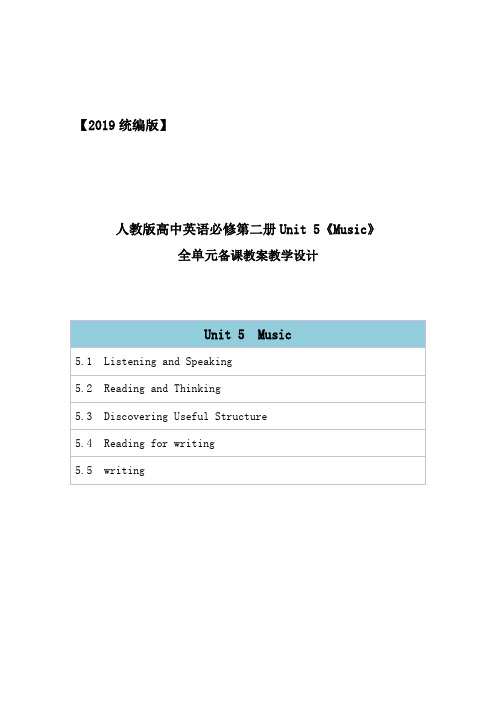
【2019统编版】人教版高中英语必修第二册Unit 5《Music》全单元备课教案教学设计Unit 5 MusicListening and Speaking【教学目标】1. Instruct students to get main facts by listening and motivate them to talk about the topics about music, the types of music, and how the music makes them feel.2. Develop students’ sense of cooperative learning and individual thinking capability.3. Develop students’ different listening skills to solve different listening comprehensive problems.4. Help students to understand how to use the structures “past participle as adverbial”.【教学重难点】Prompt students to talk about the related topics, such as types of music they know, their favourite type of music, how music makes them feel, and how to use past participle as adverbial.【教学过程】Step 1 Lead inThe teacher is advised to talk with their students about music.Boys and girls, before we listen, let’s work in pairs and discuss what type of music you know.Which type is your favorite? How does it make you feel? Share your ideas with partners.I know Chinese traditional music/classical music/country music/hip-hop/jazz/pop music/Latin music/rap/rock/punk…I like classical music. It makes me feel full of energy and happy.Step 2: PredictionAfter their small talk, the teacher can move on by finishing the following task: See the pictures and give the correct answers.1. What are the people doing in the picture below?2. Match the pictures with the correct types of music.A. Chinese traditionalB. classicalC. country musicD. hip-hop1_______________2_______________3_______________4_______________Step 3: Summary of the main ideaListeningI. Play the radio about The Sound of Music (音乐之声), and let students finish the following tasks.A star has come out to tell me1.___________________ to goBut deep in the dark-green shadowsAre voices that urge me to staySo I pause and I wait and I listenFor one more sound for one more lovely thing2.___________________ might say…The hills are alive with the sound of musicWith songs they have sung 3.__________________The hills fill my heart with the sound of musicMy heart 4.__________________ every song it hearsMy heart wants to beat like the wings of the birds that rise from the lake to the treesMy heart wants to sigh like the chime that flies from a church on a breezeTo laugh like a brook 5.__________________ and falls over stones in its wayTo sing through the night like a lark who is 6._____________I go to the hills when my heart is lonelyI know I will hear what I’ve heard beforeMy heart will 7.______________ the sound of musicAnd I’ll sing once moreII. The reporter paraphrased some of the answers the students gave him. Listen to the interviews again and complete the sentences with the words you hear.1. A: Country music touches my heart.B: So you like music that’s _______of _______?2. A: When I listen to hip-hop, I just have to move!B: So it makes you want to _______?3. A: Classical music makes me feel like I’m sitting beside a quiet stream and enjoying nature.B: So to you, it’s _______ and _______?Learning new wordsList the new words in the lesson, tell students the meaning of these words and give some examples.News words: classical, energy, soul…Talking projectGuide students to do speaking practice.I. Talk in pairs. Interview each other about music. Use the picture below for ideas.A: What kind of music do you like?B: I like techno music.A: What makes it so special to you?B: I like to listen to it when l exercise. It gives me energy.II. Work in pairs or groups and role play a conversation.●Suppose you are a reporter and interviewing the students who about music.➢I like to…➢Chinese traditional song/classical music/hip-hop music/country music…➢Listen to/play/sing…Unit 5 MusicReading and Thinking【教学目标】1. To acquire the basic usage of the new words and express concerning how computers and the Internet help us experience music.2. Enable students to understand the main information and text structure of the reading text.3. Enable students to understand past participle as adverbial.【教学重难点】1. Guide students to pay attention to reading strategies, such as prediction, self-questioning and scanning.2. To talk about the advantages and disadvantages of being a member of virtual choir.3. Lead students to understand past participle as adverbial;【教学过程】Step 1 PredictionAsk students the question.How can computers and the Internet help us experience music differently?Step 2: Learning new wordsLearn words:perform,enable,prove,award,and fall in love with…New words practiceIn order to have a good _______________ (perform), I have made good preparations for it.At present, developing the ___________ (able) of the students is an important task in our daily teaching activity.Step 3: Learning sentence patternsIntroduce the sentence patterns in the lesson and give some examples and explanation1. as 引导定语从句,意为“正如,正像”2. 过去分词(短语)作状语as引导定语从句的常用句式有:as is known to all 众所周知as we all know我们都知道as we can see正如我们所看到的as is reported正如报道的as is often the case这是常有的事as is mentioned above如上所述Step 4: Fast reading tasksGuide student to read the article quickly, teach some reading skills and do some exercises.Task of the first fast reading:Read quickly and figure out the key words of each paragraph.•Paragraph 1: enable•Paragraph 2: award•Paragraph 3: performanceTask of the second fast reading:1. What is mainly discussed in this passage?2. Which paragraph mentions background information about the virtual choir?3. Which paragraph mentions the conclusion of the virtual choir?Step 5: Careful reading tasksGuide student to read the article carefully and do some exercises.1. What is the attitude towards the virtual choir?2. Why does the virtual choir prove to be a good influence on the lives of many people?3. If you want to take part in a virtual choir, you need….Step 6: Study reading tasksAnalyze two difficult sentences in the text.1. Imagine having the opportunity to sing together with hundreds of other people while you are at home alone.2. A virtual choir enables them to add their voices to those of other individuals and become part of the global community.Step 7 Homework:Review what we have learned and find out the key language points in the text.Unit 5 MusicDiscovering Useful Structure【教学目标】1. Get students to have a good understanding the basic usage of past word segmentation as past segmentation as predicative and adverbial.2. Strengthen students’ great interest in grammar learning.3. Instruct students to express their ideas with this grammar correctly.【教学重难点】How to enable students to use the structure and meaning of past word segmentation as past segmentation as predicative and adverbial.【教学过程】Step 1 Lead-inGive some messages and ask students to guess who she is.英语过去分词的句子。
- 1、下载文档前请自行甄别文档内容的完整性,平台不提供额外的编辑、内容补充、找答案等附加服务。
- 2、"仅部分预览"的文档,不可在线预览部分如存在完整性等问题,可反馈申请退款(可完整预览的文档不适用该条件!)。
- 3、如文档侵犯您的权益,请联系客服反馈,我们会尽快为您处理(人工客服工作时间:9:00-18:30)。
how they developed ad a real band
14
Detailed reading 1. How do most people form a band? Put the following steps in right order.
_____ Make recห้องสมุดไป่ตู้rds.
_____ Give performance in the pubs or clubs
Forms
They may play to passersby in the street or subway.
Results
They can earn some extra money. They may also have a chance to dream of becoming famous.
10
Fast reading: Answer the questions
1) How many bands are mentioned in the passage? What are their names?
Two. “The Beatles” and “The Monkees”. 2) Which band is “The Band That
paragraph
main ideas
1 Many people want to be famous
as singers or musicians 2 This is how most bands start
3 The monkees started in a different way
4
How the monkees became popular and
Wasn’t”?
“The Monkees”.
2 minutes
11
Reading-I----skimming (3m)
Read the text as quickly as you can and find out the main idea of each paragraph. Paragraph1: Paragraph two: Paragraph three: Paragraph four:
Paragraph 2:How musicians form bands.
Paragraph 3:How the band got their start.
Paragraph 4:How the Monkees became serious
about their business.
13
Careful reading
18
2.How was the Monkees formed and became a real band?
beginning of the band style of the performance (表演方式) first music and jokes
development of the band changes of the band
17
Why the names of Song Zuying and Liu Huan are mentioned in P1? A. Because that they are very famous. B. Because they can sing very well. C. The text only want us to know them. D. The text is giving us some examples of the famous singers that we might want to be like.
19
How was the Monkees formed and became a real band?
6
The Beatles
7
West life
8
The Monkees
9
Can you ask some questions to predict what the passage
is about?
What is the name of the band? How does it become famous? What is its style?
Book 2 Unit 5 Music
Reading
1
Do you know these bands at home and abroad?
S.H.E.
Twins
2
F.I.R
The flowers
3
Mayday 4
The 12-woman group of China
5
The Backstreet Boys
12
Reading-I----skimming (3m)
Read the text as quickly as you can and find out what each paragraph is mainly about.
Paragraph1:Dreaming of being famous musician or singer.
_____ Musicians get together and play music at home.
_____ Play music in the street or subway.
15
Careful-reading
How do people form a band ? (Para.2)
Step 1 to practise music at home Step 2 to play i_n__th_e__s_tr_e_e_t_o_r_s_u_b_w__a_y_ Step 3 to give performances
_i_n_p_u__b_s_o_r_c_l_u_b_s_ Step 4 to make records _in__a_s_t_u_d_i_o
16
Members Reasons
Places
High school students
They like to write and play music.
They practice their music in someone’s home.
